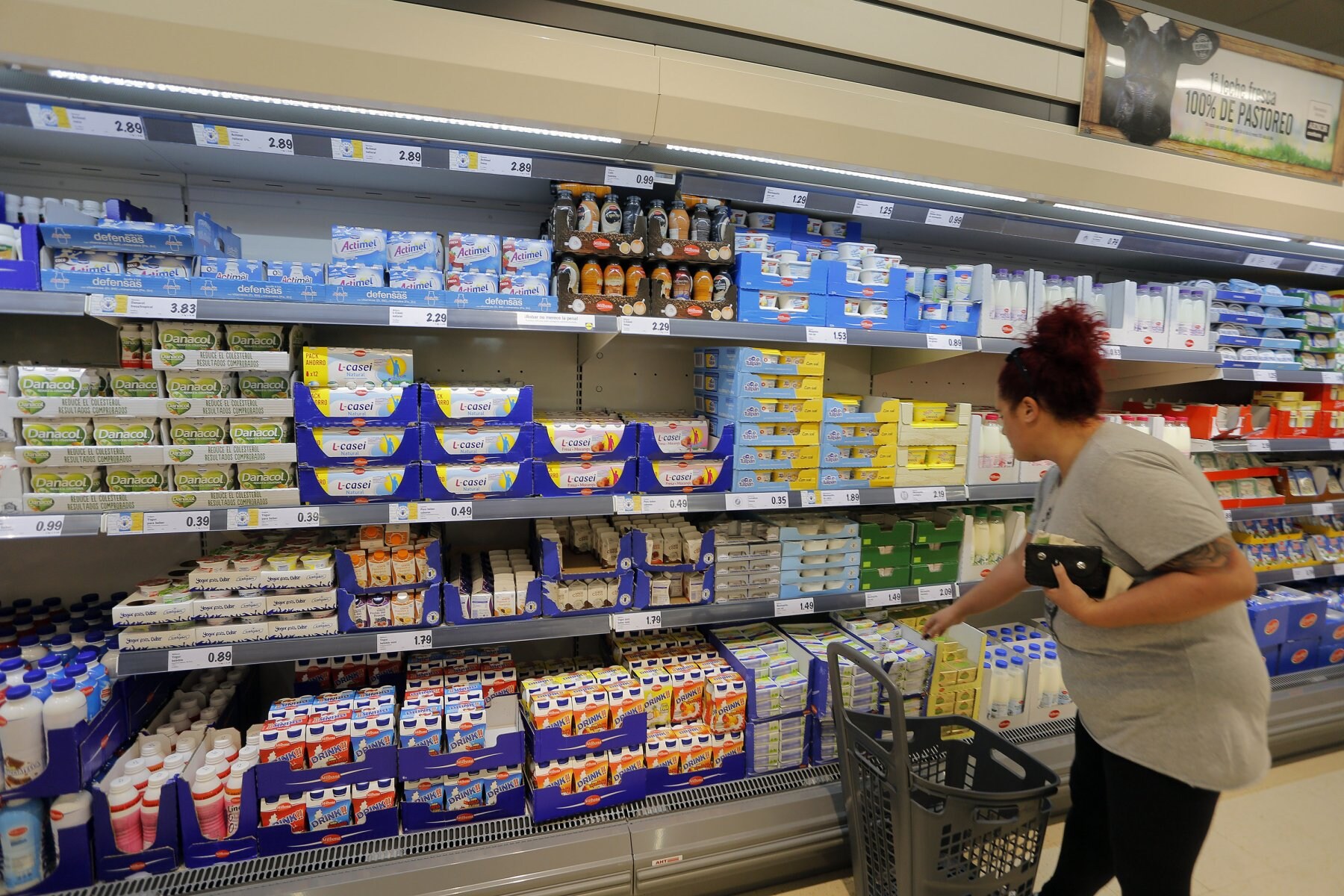Inflation will cost Canarian families 2,300 euros this year

A woman in front of the shelves of dairy and fresh products in a supermarket in Arrecife, Lanzarote. /
Housing, food and transportation account for 65% of island household spending and are the most inflationary groups in 2022, according to a CC OO study
The brutal rise in prices -by 9.8% in March according to the advance data that will be confirmed tomorrow- is cutting the spending capacity of Canarian families, who are increasingly impoverished. Wages have barely risen 2% (according to the latest data from February 2022) while the prices of food, clothing, electricity, fuel... have not stopped rising, pushing Canarian households to the limit .
According to the data handled by the CC OO Canarias union, the accumulated inflation to date will mean a rise of 2,343.2 euros this year for Canarian families. The technical office has extracted these data after verifying that Canarian households allocate 65% of their total spending to housing, transport and food and non-alcoholic beverages, which are precisely the three most inflationary groups on the islands with increases of 22.3 %, 11.4% and 6.1%, respectively, according to the Family Budget Survey of the National Institute of Statistics.
DETAIL
-
living place
The average expenditure of a Canarian household is 7,378 euros per year. Inflation raises it by 1,645 euros. -
Food
A Canarian family spent a total of 4,334 euros in 2021. The rise in prices makes them more expensive by 264 euros per year. -
Transport
The average cost of an island family per year was 2,598 euros. Now you will pay almost 300 euros more. -
Restaurants
A Canarian household spent 1,106 euros a year, with the rise in prices they will spend 50 euros more.
In absolute figures, the item that each island household spends to pay for these products amounts to 14,311 euros, with which the inflationary process results in a rise of 2,300 euros per year.
"It is money that households will have less to spend on other groups of products such as education, clothing and footwear, communications, restaurants and hotels," they point out from the technical office of CC OO.
Precisely this extra cost is going to cause a containment and fall in the internal consumption of the islands, as is already beginning to be verified. “There will be households that will be able to increase and cover this higher expense, but those that cannot will reduce consumption, in any case making clear the loss of purchasing power and impoverishment of our society”, it is made clear from the technical office of CC OO.
In the case of housing, the average expenditure of a Canarian household was 7,378 euros in 2021; with inflation it now shoots up to 1,645 euros;. In the case of food, Canarian families will now pay almost 300 euros more; 300 euros will pay more in transport and almost 50 in restaurants and hotels, up to a total of 2,343 euros per year.
The prospects for the coming months "are not at all rosy" according to the trade union organization, which predicts that the CPI could be above 10%.
The CC OO warns that the situation is especially "serious" in the non-capital islands where prices are higher, as highlighted by the purchasing power parity index. With a regional average of 100, Tenerife appears as the island with the cheapest shopping basket, with 96, while La Gomera is the most expensive, with 104.
The parity data show the existence of a cost of double insularity suffered by non-capital islands and especially the western ones of El Hierro and La Gomera. «There is no effective compliance, therefore, with one of the guiding principles of our Statute of Autonomy, which is the promotion of the economic, territorial and social cohesion of the archipelago, guaranteeing equal rights regardless of the place of residence», it is pointed out from the union organization.
By product, fresh fruit makes the biggest difference, up to 22 points, with Lanzarote being the most expensive. Following are non-alcoholic beverages, fresh vegetables, bread and dairy products with a difference of more than 15 points. El Hierro is the island with the highest prices.
The CCE asks for a tax cut to “help” families
The president of the Canarian Confederation of Entrepreneurs (CCE), Agustín Manrique de Lara, was convinced that inflation will exceed double digits in the coming months and advocated a tax reduction, at national and regional level, to try to contain the drop in consumption and «help families» by freeing up their income.
Regarding the critical voices in the face of a tax cut, since it could cause higher inflation, Manrique explains that prices do not go up due to skyrocketing consumption but rather due to rising costs and by lowering rates, what would be achieved would be to maintain demand for families that begins to fall due to inflation.
Manrique also considered an income pact essential to share the impact of the rise in prices between public administrations, companies and families. “We trust that the decisions of the administrations will not be long in coming, especially at a time when the collection is at record figures,” he points out.
In his words, "the suffering of families and companies does not make sense when public administrations are closing with a surplus based on collecting more."
In the Canary Islands, according to the president of the CCE, there is the possibility of acting on the IGIC (which taxes consumption) and the regional section of the IRPF. "What is happening right now is dialogue to share the effort," says Manrique.
Finally,
Regarding the rise in wages, the president of the CCE advocates increases that do not exceed 3% and never based on 10% inflation. "We are at a juncture where a bad performance would mortgage the next few years," she says. He also considers better efficiency in public management to be key.











